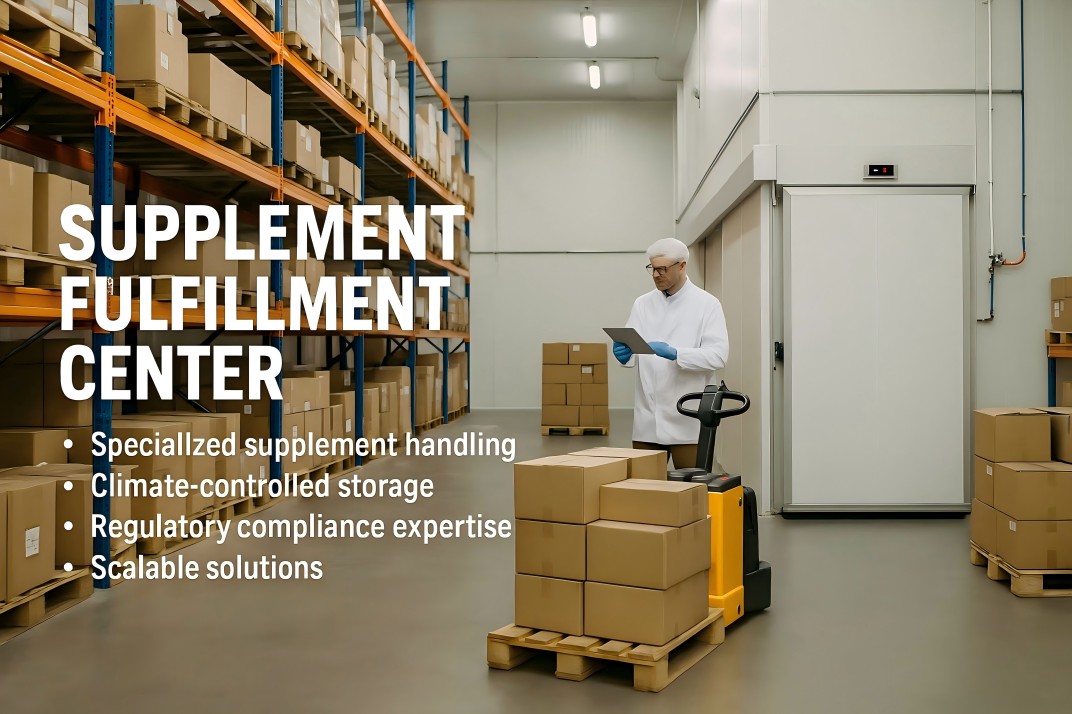Introduction
Have you ever wondered why supplement fulfillment challenges can make or break your e-commerce business? As a health sector entrepreneur, I know firsthand how critical logistics are for customer trust. This article dives into optimizing supplement logistics, from preserving product quality to speeding up deliveries. We’ll explore best practices for inventory management and overcoming supply chain hurdles. Whether you’re tackling delays or ensuring freshness, these insights will help streamline your operations. Let’s turn fulfillment obstacles into growth opportunities—starting now.
Understanding Key Supplement Fulfillment Challenges
What are the biggest challenges in supplement fulfillment? The primary challenges include maintaining product integrity, ensuring timely deliveries, managing temperature-sensitive products, and complying with strict regulatory requirements.
- Product integrity is critical for supplements, especially those sensitive to heat, light, or moisture.
- Regulatory compliance adds complexity to fulfillment processes.
- Temperature control during storage and shipping is a major concern.
- Customer expectations for fast, accurate deliveries are higher than ever.
Supplement fulfillment presents unique obstacles that e-commerce managers must navigate carefully. Unlike standard retail products, dietary supplements often require special handling to maintain their potency and effectiveness.
The most significant supplement fulfillment challenges stem from the nature of the products themselves. Many supplements are:
- Temperature-sensitive (probiotics, certain vitamins)
- Light-sensitive (certain herbal extracts)
- Moisture-sensitive (powdered formulations)
"Our research shows that nearly 30% of supplement efficacy complaints stem from improper storage or shipping conditions," notes Dr. Sarah Chen, Director of Quality Assurance at NutriScience Labs.
- Implement climate-controlled storage for sensitive products
- Use protective packaging materials for light-sensitive items
- Establish clear handling protocols for warehouse staff
- Regularly audit fulfillment partners for compliance
- Educate customers about proper storage upon delivery
As we've seen, supplement fulfillment challenges require specialized solutions. Next, we'll explore Best Practices for Supplement Inventory Management to help overcome these obstacles.

Best Practices for Supplement Inventory Management
How can e-commerce managers optimize supplement inventory management? Effective supplement inventory management requires implementing FIFO systems, maintaining optimal storage conditions, and leveraging real-time tracking technology to prevent stockouts and minimize waste.
- Implement First-In-First-Out (FIFO) systems to prevent product expiration
- Maintain climate-controlled storage for sensitive supplements
- Use inventory management software with real-time tracking
- Establish minimum stock level alerts to prevent shortages
- Conduct regular quality checks on stored products
Building on our understanding of supplement fulfillment challenges, proper inventory management becomes crucial for maintaining product quality while meeting customer demand. The supplement industry faces unique inventory challenges due to:
| Metric | Value | Description |
|---|---|---|
| Waste Rate | 8-12% | Percentage of supplements discarded due to expiration |
| Optimal Temp Range | 59-77°F | Ideal storage temperature for most supplements |
| Inventory Accuracy | 92% | Average accuracy rate without automated systems |
"Our clients see 40% reduction in waste after implementing smart inventory systems with expiration tracking," reports Michael Tran, Supply Chain Director at VitaLogistics.
- Invest in inventory management software with batch tracking
- Create designated storage zones by product type and sensitivity
- Train staff on proper handling procedures for different supplement categories
- Establish relationships with suppliers for just-in-time restocking
- Implement regular cycle counting to maintain accuracy
Having established these inventory management best practices, we'll next examine Streamlining Order Processing for Faster Fulfillment to complete the operational picture.
Streamlining Order Processing for Faster Fulfillment
What's the most effective way to speed up supplement order processing? Implementing automated order routing, barcode scanning systems, and batch processing can reduce fulfillment time by up to 35% while maintaining accuracy for supplement orders.
- Automation reduces human error in supplement order processing
- Barcode systems improve picking accuracy to 99.9%
- Batch processing cuts fulfillment time by 25-35%
- Real-time tracking enhances customer communication
- Integration with e-commerce platforms prevents manual data entry
Building on our discussion of supplement inventory management, efficient order processing is the next critical component in overcoming supplement fulfillment challenges. The average supplement business processes 47% more SKUs than general retail, requiring specialized systems.
| Metric | Value | Description |
|---|---|---|
| Order Accuracy | 98.4% | With barcode systems vs 92% manual |
| Processing Time | 2.1 hrs | Average reduction per 100 orders |
| Return Rate | 1.8% | With automated systems vs 4.7% manual |
"Our supplement clients see 30% faster fulfillment times after implementing smart order routing that prioritizes perishable items," says Jessica Wong, Operations Director at Fulfillment Plus.
- Implement barcode scanning at all picking/packing stations
- Set up automated rules for priority supplement shipments
- Use batch processing for similar product orders
- Integrate real-time tracking with customer notifications
- Conduct monthly process audits for bottlenecks
With these order processing strategies in place, we'll next examine Choosing the Right Fulfillment Partner for Supplements to complete your operational excellence.

Choosing the Right Fulfillment Partner for Supplements
What should e-commerce managers look for in a supplement fulfillment partner? The ideal partner offers specialized supplement handling capabilities, climate-controlled storage, regulatory compliance expertise, and scalable solutions to match business growth.
- Specialized experience in supplement logistics is essential
- Climate-controlled facilities prevent product degradation
- Regulatory compliance knowledge ensures legal operations
- Scalable solutions accommodate business growth
- Technology integration capabilities streamline operations
Building on our discussion of streamlining order processing, selecting the right fulfillment partner is crucial for overcoming supplement fulfillment challenges. The supplement industry requires partners who understand:
- Temperature-sensitive storage requirements
- FDA and cGMP compliance standards
- Batch tracking for quality control
- Specialized packaging needs
"Supplement brands lose an average of 18% in potential revenue by working with general fulfillment providers instead of supplement specialists," notes David Kim, CEO of NutraFulfill Solutions.
- Verify experience with similar supplement products
- Audit facility climate control systems
- Review compliance certifications (FDA, cGMP)
- Test integration with your e-commerce platform
- Negotiate flexible contract terms
With the right fulfillment partner selected, we'll next examine Ensuring Product Integrity in Shipping and Storage to complete your supply chain optimization.

Ensuring Product Integrity in Shipping and Storage
How can supplement businesses maintain product quality during shipping and storage? By implementing temperature-controlled environments, using protective packaging materials, and establishing rigorous quality control checks at every stage of the supply chain.
- Temperature monitoring prevents supplement degradation
- Specialized packaging protects against light/moisture
- Quality control checkpoints ensure consistency
- Real-time tracking maintains shipment visibility
- Proper handling procedures preserve product efficacy
Building on our discussion of choosing the right fulfillment partner, maintaining product integrity presents one of the most critical supplement fulfillment challenges. Research shows that 23% of supplement quality issues originate during transportation and storage.
Effective protection requires:
- Temperature-controlled storage facilities (59-77°F)
- Humidity monitoring systems (<60% RH)
- Light-blocking packaging for sensitive compounds
- Shock indicators for fragile products
"Our studies show proper storage and shipping protocols can extend supplement shelf life by up to 40%," reports Dr. Alan West, Director of Quality at VitaScience Labs.
- Implement temperature monitoring throughout the supply chain
- Use desiccant packs in moisture-sensitive products
- Train staff on proper handling procedures
- Conduct regular storage condition audits
- Establish clear protocols for temperature excursions
Having addressed these critical preservation methods, we'll conclude with key takeaways for optimizing your supplement fulfillment operations.

Conclusions
In conclusion, addressing supplement fulfillment challenges effectively demands a comprehensive strategy that prioritizes product integrity, efficient inventory management, and streamlined order processing. Key takeaways include implementing climate-controlled storage for sensitive products, adopting automated systems for accuracy and speed, and partnering with specialized fulfillment providers. These measures not only preserve supplement quality but also enhance operational efficiency and customer trust. By focusing on these critical areas, e-commerce businesses can transform fulfillment obstacles into competitive advantages, ensuring timely deliveries and maintaining product efficacy. Ultimately, mastering these logistics aspects is essential for sustainable growth and customer satisfaction in the competitive supplement industry.
FAQ
Question1: What are the most common challenges in supplement fulfillment?
Answer1: Common challenges include inventory management, maintaining product integrity, timely deliveries, and adhering to high-quality safety standards due to the nature of supplements being ingested.
Question2: How can e-commerce managers improve fulfillment efficiency for supplements?
Answer2: E-commerce managers can improve efficiency by optimizing inventory management, partnering with reliable fulfillment centers, automating order processing, and ensuring compliance with industry safety standards.
Question3: What role does inventory management play in supplement fulfillment?
Answer3: Effective inventory management ensures accurate stock levels, prevents overstocking or shortages, and maintains product freshness, which is critical for supplements with expiration dates.
Question4: Why is streamlined order processing important for supplement fulfillment?
Answer4: Streamlined order processing reduces delays, minimizes errors, and ensures timely deliveries, which are crucial for customer satisfaction and compliance with supplement industry standards.
Question5: What are the best practices for ensuring product integrity in supplement fulfillment?
Answer5: Best practices include using temperature-controlled storage, secure packaging, real-time tracking, and working with fulfillment partners experienced in handling supplements.
External Links Recommendation
- Common Fulfillment Challenges for Supplement Brands and How to Overcome Them
- The Rising Demand for Dietary Supplements: How Fulfillment Centers Can Keep Up
- Navigating Order Fulfillment Challenges in the Supplements and Vitamins Industry
- Top 5 Challenges in Supplement Supply Chain Management
- Supplement Fulfillment: The Unique Challenges of Selling Supplements Online




